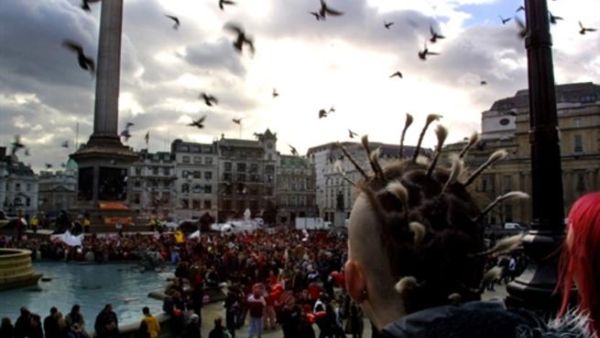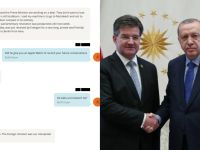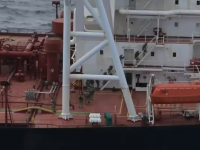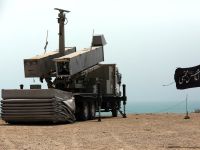There's a funny side to everything it seems, even the catastrophic diagnosis of advanced cancer which sent me scuttling from sunny Bahrain to wintry London two months ago.
This sudden departure meant total upheaval for the entire family, my wife Sara and three children, aged five, three and 16 months.
I naively thought we could get a second opinion and a treatment plan which could be carried out here, then return to the comfort of what has become our only real home, where we would be surrounded by friends as the battle for life was won or lost.
When we left Bahrain I was under a death sentence, handed down by a doctor who gave me six months to a year.
Thankfully, he has been proved wrong and the specialist now treating me predicts a full recovery, somewhere down a long road of drug therapy and eventual surgery, all of which will be in London.
So life has changed beyond recognition overnight, from sweating it out in the heat at pick-up time at St Christopher's School in Saar, to stomping for warmth in the snow-covered playground of Fulmer Infant School, near Sara's dad's home in Gerrards Cross, Buckinghamshire.
Almost everything we own has been left behind, including all but a handful of the children's toys, which brings us to the first twist of comedy in our saga.
Our eldest, Noor, is now at what was Sara's old school when she was a child, a school known for its emphasis on social conscience and care for the environment.
Last month it ran an event amongst the pupils, in support of the annual Children In Need programme, which climaxed with a televised telethon fronted by Terry Wogan.
Noor and her classmates were told how the appeal was for children not so fortunate as them, many of whom had no homes, or enough food or water, let alone toys.
She was explaining it at home to her mum, when a similarity struck her.
"Children in need have no toys," she said, then exclaimed in horror: "Mummy, we have no toys. Mummy, we are children in need !".
I was certainly in desperate need when I found myself standing on London's Marylebone railway station, watching my train home leave without me because my hands were too paralysed to reach into my pocket for my ticket.
My predicament was the result of an immediate onset of one of the most acute side-effects of the five to six-hour chemo therapy sessions I must now undergo every two weeks, followed by 44 hours on an infusion pump at home.
One of the potential side-effects is a massively heightened sensitivity to the cold, which causes severe tingling and numbness in the face, lips, toes and fingers, along with spasms in the throat from breathing in extremely cold air.
It normally wears off once you warm up, but can cause lasting nerve damage if it persists.
A 15-minute walk in freezing sleet from the cancer clinic to the station took a bitter toll on the flesh and my hands were reduced to useless lumps at the end of my wrists.
I got my gloves off with my teeth, but could not even get my hand into my pocket for my rail ticket, let alone pull it out and slot it into the automatic turnstile barring the way to the platform.
Asking a stranger - man or woman - to stick their hand in your pocket is likely to get you a punch in the mouth or arrested, so I watched in frustration as my train pulled off without me.
Then, in a moment of genius, I remembered the warm-air hand dryers in the gents' lavatory and headed off to have life breathed back into my hands - but even this was not to be so simple.
The first obstacle was yet another automatic turnstile, which demands 30p to let the desperate pass unhindered.
Trying to get three 10p coins out of your pocket and into the slot, with no feeling in your fingers is no easy task.
My struggle aroused the interest of a security attendant and it was with puzzled sympathy that he completed the job for me.
It took only seconds for the dryer to restore the use of my fingers, by which time I desperately needed a pee.
Thank goodness that hadn't been my first need, for I certainly could not have asked for help with that !
One reason for early signs of success in my treatment is that I am apparently an "exceptionally fit 55-year-old", an assessment which initially had me doubting this world-renowned specialist's skills, since I have led a life far from exemplary in terms of care and maintenance for the temple we call a body.
He was not however, referring to my physique, but to the fact that I have no other medical problems - in other words I am "exceptionally fit" for what can be an arduous, last-ditch treatment programme.
Many cancer patients have other complications or their bodies reject the chemotherapy, denying them the lifeline to recovery.
But amid my misfortune in this disease being allowed to creep up on me while an annoying complaint was dismissed by various Bahrain doctors as irritable bowel syndrome, has come good and the predicted outcome is life, rather than an early death.
Much of the miracle of science is being conducted in a hi-tech treatment suite in the bowels of what was once one of the finer homes of the "Upstairs Downstairs" era, when the wealthy lived above ground, while their servants toiled below.
Each patient reclines in an individual pod, furnished with what looks like a dentist's chair with all sorts of gizmos attached, including a screen providing TV and Internet access, to while away the hours hooked up to an intravenous drip.
The sensation of being in a space ship is heightened by the sight of some patients in blue, conical hats with protruding tubes - which are designed to chill the scalp and help reduce the rate of hair loss sometimes associated with chemo-therapy.
I was not offered the option, partly no doubt, because nature has already stolen much of what was there.
"No change" in the side-effects log I must fill in every fortnight means that I am as bald now as when I went in.
Patients' ages range from the very young to the seriously elderly and it is a tribute to the determination of the medical team to saving life that people are being given treatment that may once have been denied them because of their age.
One thing common to us all is a frequent need for the loo, as a result of the constant flow of medication, saline flushes and rehydration fluids being pumped through our systems for hours on end.
The sight of a steady flow of patients shuffling across the floor to and from the lavatory, trailing their portable drips alongside them, is a comical sight and results in occasional "traffic jams".
I have, from my pod, a clear view of the path to the loo and seem to have the weakest bladder of the lot, as I make the journey at least a dozen times during my stay.
In this, I am rivalled only by my neighbour, who is so stooped and slowed by age that getting behind him en route is like getting stuck behind a tractor on a country lane.
Courtesy has deserted me and I keep an eye out for him, sometimes letting him get a considerable head-start, before unplugging myself and setting out to overtake him, my drip carriage rattling with the speed, before he reaches the "chicane" - the narrow, single-lane corridor that leads to the toilet.
The sense of triumph as I squeeze past is unbecoming, but we are talking survival here in a race dictated not by conscience but by the bladder.
In truth, there are two toilets and should one be already taken I have always stepped aside to allow my nemesis to take the other, satisfied in the knowledge that victory was mine.
This unsporting conflict is an accidental parody of the reality that all of us in the treatment suite are in a race against time and that some will not survive.
While we do not wish each other any harm, each is wishing to be amongst the survivors.








